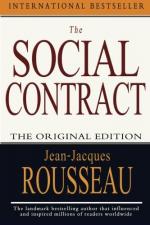
|
| Name: _________________________ | Period: ___________________ |
This test consists of 15 multiple choice questions and 5 short answer questions.
Multiple Choice Questions
1. The author compares authoritarian societies to which of the following social structures?
(a) Family.
(b) Work.
(c) Friends.
(d) Military.
2. According to the author, every human being lives in which of the following?
(a) Need.
(b) Skin.
(c) Chains.
(d) Houses.
3. According to the author, which of the following situation takes place within a state that is plagued by uncertainty?
(a) There is a revolution.
(b) It is conquered.
(c) It fixes itself.
(d) It falls apart.
4. According to the author, unless natural circumstances are taken into account by the legislator, the laws will be which of the following?
(a) Broken.
(b) Weak.
(c) Useless.
(d) Hard to follow.
5. The Sovereign Will is the expression of desired action to meet which of the following?
(a) The needs of the government.
(b) The needs of the state.
(c) The needs of the community.
(d) The needs of the citizens.
6. The author believes that the more bureaucracy that there is, the more that the government will be dominated by which type of will?
(a) Political will.
(b) General will.
(c) Private will.
(d) Sovereign Will.
7. According to the author, the more Magistrates that there are, the closer that the government is to which of the following?
(a) The ability to act well.
(b) A good government.
(c) The will of the people.
(d) A true republic.
8. According to the author, from which of the following does justice flow?
(a) God.
(b) The general will.
(c) The law.
(d) Nature.
9. According to the author, who benefits in war?
(a) The rulers.
(b) No one.
(c) The soldiers.
(d) The rich individuals.
10. The social contract equalizes all men in which of the following?
(a) Legal rights.
(b) Societal rights.
(c) Political rights.
(d) Possession rights.
11. By which of the following terms does the author state that the power of deciding for the whole of the body can only be established?
(a) Veiled proceedings.
(b) Convention.
(c) Proper ordering.
(d) Totality.
12. The author suggests that which of the following types of law is the foundation for all other laws?
(a) Fourth.
(b) First.
(c) Third.
(d) Second.
13. Chapter 12 of Book 2 might best be described as which of the following types of chapter?
(a) Closing.
(b) Climactic.
(c) Opening.
(d) Transition.
14. When the author writes of a sovereign within the social contract, he refers to which of the following?
(a) The single ruler.
(b) The outward will of the group.
(c) The person in leadership of the group.
(d) The collective authority.
15. The state is supposed to enact laws that protect personal property from which of the following?
(a) Being taken.
(b) Being taken by law.
(c) Being taken by others.
(d) Being taken by force.
Short Answer Questions
1. Which of the following terms refers to a generalized rule, way of communicating, or way of conducting affairs?
2. The first type of laws govern the interaction between the state and which of the following?
3. According to the author, which of the following contributes toward obedience having less value?
4. The author believes that every individual has the responsibility to die in defense of which of the following?
5. The author states that moral equality must be substituted for which of the following in a social contract?
|
This section contains 509 words (approx. 2 pages at 300 words per page) |

|




